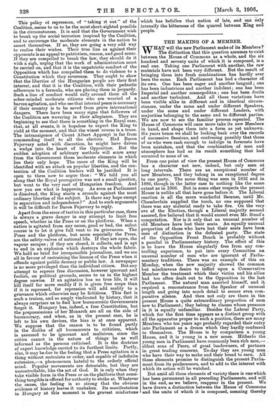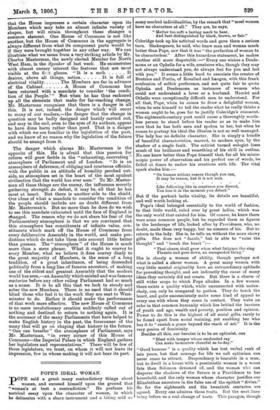THE MAKING OF A MEMBER.
WHA.T will the new Parliament make of its Members ? The distinction that this question assumes to exist between the House of Commons as a whole, and the six hundred and seventy units of which it is composed, is a, real one. Taking one Parliament with another, the raw materials have not been very different. But the result of bringing them into fresh combinations has hardly ever been the same. Each Parliament has had a character of its own. One has been eager and another languid ; one has been industrious and another indolent; one has been Imperial and another cosmopolitan ; one has been docile and another turbulent. And all these variations have been visible alike in different and in identical circum- stances, under the same and under different Speakers, under the same and under different Leaders, with majorities belonging to the same and to different parties. We are now to see the familiar process repeated. The House of Commons will once more take its new Members in hand, and shape them into a form as yet unknown. Six years hence we shall be looking back over the records of successive Sessions, and confessing possibly that those of us who were rash enough to indulge in forecasts have been mistaken, and that the combination of men and atmosphere has had as its result something that had occurred to none of us.
From one point of view the present House of Commons has a character not new, indeed, but only seen at long intervals. There are an exceptional number of new Members, and they belong in an exceptional degree to one party. The same thing was seen in 1832 and in 1886, though in the latter case to nothing like the same extent as in 1906. But in some other respects the present House is unlike all that have gone before it. The Liberal reaction is all the more wonderful &rause, until Mr. Chamberlain supplied the torch, no one supposed that there was any material ready to take fire. On the very. eve of the Election, though a Liberal majority seemed assured, few believed that it would exceed even Mr. Stead's computation. Nor is it only that an unusual number of.. old Members have lost their seats. An equally unusual proportion of those who have lost their seats have been. men of distinction in the defeated party. The state of the Opposition Front Bench is probably , without a parallel in Parliamentary history. The effect of this is to leave the House singularly free from any con- trolling experience, to put into every Committee an unusual number of men who are ignorant of Parlia- mentary traditions. There was an example of this on Monday, when the new majority showed the common but mischievous desire to inflict upon a Conservative Member the treatment which their victim and his allies had too often dealt out to the Opposition in the last Parliament. The natural man asserted himself, and it required a remonstrance from the Speaker of unusual length and going into much detail to secure even com- parative silence. And then not only are there in the present House a quite .extraordinary proportion of men new to Parliament; they belong to classes whose presence in it is equally unfamiliar. Besides the Labour Party, which for the first time appears as a distinct group with all the apparatus proper to such a position, there are many Members who ten years ago probably regarded their entry into Parliament as a dream which they hardly confessed to themselves. The House is by comparison a young House, and it is young in a new sense. Hitherto the , young men in Parliament have commonly been rich men,— , eldest sons of Peers, of great landowners, of partners in great trading concerns. To-day they are, young men: who have their way to make and their bread to earn. All these elements promise to distinguish the present Parlia- ment from its predecessors, and to add to the interest with which its action will be watched.
But amid all these elements of variety there is one which has been permanent in all preceding Parliaments, and will in the end, as we believe, reappear in the present. We have drawn a distinction between the House of Commons and the units of which it is composed, meaning thereby that the House impresses a certain character upon its Members which may take an almost infinite variety of shapes, but will retain throughout these changes a common element. One House of Commons is not like another, but the House of Commons in the aggregate is always different from what its component parts would be if they were brought together in any other way. We can illustrate what we mean from a very striking article by Mr. Charles Masterman, the newly elected Member for North West Ham, in the Speaker of last week. He enumerates with almost uneasy interest the features that are most visible at the flr3t glance. "It is a mob It desires, above all things, action It is full of electrical vitality The Members are far in advance of the Cabinet. . . A House of Commons has been returned with a mandate to consider the condi- tion of the People.'" But when he has thus reckoned up all the elements that make for far-reaching change, Mr. Masterman recognises that there is a danger in all this. It is not, indeed, the danger which • will occur to many of our readers,—the danger that the change in question may be badly designed and hastily carried out, and may in the end, even to the eyes of its authors, appear to have done harm rather than good. That is a danger with which we are familiar in the legislation of the past, and we know of no reason why the legislation of the future should be exempt from it.
The danger which alarms Mr. Masterman is the opposite of this. He is afraid that this passion for reform will grow feeble in the "exhausting, enervating" atmosphere of Parliament and of London. "It is an atmosphere of deference, of obliging and courteous officials, with the public in an attitude of humility perched out- side, an atmosphere set in the heart of the most opulent civilisation that the world has ever seen." To Mr. Master- man all these things are the enemy, the influences secretly gatherine.° strength „to defeat, it may be, all that he has most at heart. But there is another side to the shield. Our ideas of what a mandate to consider the condition of the people should include are no doubt different from Mr. Mastermates. But no more than he does do we wish to see this mandate exhausted until the face of England is changed. The reason why we do not share his fear of the Parliamentary atmosphere is that we are convinced that this atmosphere has constituents of infinite value, con- stituents which mark off the House of Commons from every deliberative Assembly in the world, and make pre- dictions which do not take them into account little better than guesses. The " atmosphere " of the House is much more than a mere phrase. What it ought to convey to every Member, what we believe it does convey dimly to the great majority of Members, is the sense of a long tradition, of a great inheritance, of being descended politically from a long line of famous ancestors, of making one of the oldest and greatest Assembly that• the modern world has seen,—an Assembly which existed and was famous centuries before any other ruling Parliament had so much as a name. It is to all this that we look to steady and sober the new Members. There is no need that it should blind those who feel it to the work they are sent to West- minster to do. Rather it should make the performance of that work more effective. The new House of Commons is no mere revolutionary creation suddenly called out of nothing and destined to return to nothing again. It is the successor of the many Parliaments that have helped to make English history in the past, the forerunner of the many that will go on shaping that history in the future. "One can breathe" the atmosphere of Parliament, says Mr. Masterman, "in every corner of this House of Commons—the Imperial Palace in which England gathers her legislators and representatives." There will be few of those legislators, we trust, on whom it will not leave its impression, few in whose making it will not bear its part.















































 Previous page
Previous page